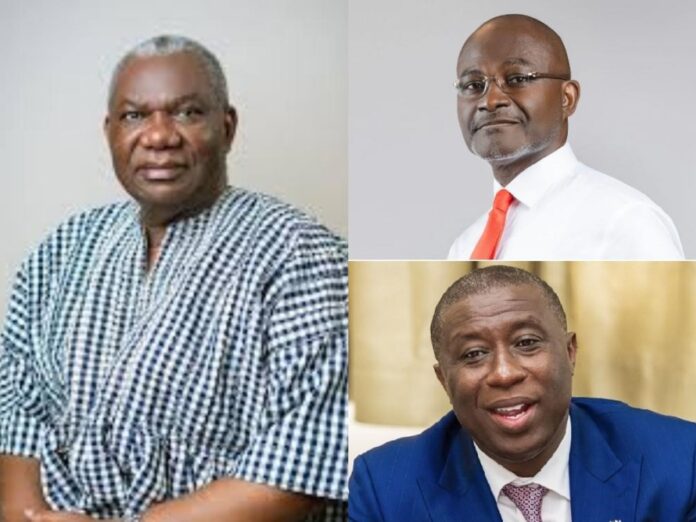Ghana’s leading opposition party, the New Patriotic Party (NPP), is facing internal push-back over a proposed reform that would, for the first time, see the party elect its flagbearer before choosing national, regional and constituency executives.
This reversal of the party’s usual bottom-up electoral structure is being described by critics as a “top-down” approach, an approach that is drawing strong opposition from some of the party’s most prominent members who are accusing certain elements of pursuing a self-seeking agenda.
It would be recalled that in June this year, the NPP announced that it has fixed January 31, 2026, for the presidential primary for the 2028 election to precede national, regional and constituency elections.
The decision was taken after the National Executive Committee of the party met on Tuesday, June 17, 2025.
The General Secretary of the party, Justin Frimpong Kodua, told the press after the meeting that the decision was subsequently endorsed by the party’s National Council.
The upcoming primaries are seen as a pivotal moment for the party as it begins preparations for a potential return to government.
But, leading members of the party have condemned the approach.
Deputy Protocol Director of NPP
Kwabena Frimpong, the Deputy Protocol Director of the NPP, described the proposal as a betrayal of the party’s foundational values.
In an open letter dated May 16, 2025, he cautioned: “No one begins building a house by installing the roof before laying the foundation.”
Mr Frimpong insisted the party’s electoral strength lies in the traditional hierarchy—polling stations to national—and reversing this would “sideline the base” and encourage internal manipulation.
He further warned that “choosing a flagbearer before electing party executives could lead to favoritism and imposition, damaging transparency and unity.”
Organizationally reckless
Former Energy Minister, Boakye Agyarko and flagbearer hopeful of the NPP minced no words in June when he described the proposed reform as “strategically unsound, politically indefensible, and organizationally reckless.”
He maintained that without strong party structures in place, selecting a flagbearer first is “a recipe for disaster.”
Fix the party before flagbearer talk
Patrick Yaw Boamah, MP for Okaikwei Central, told Channel One TV’s The Point of View on June 23 that the NPP must address internal cracks before launching into a flagbearer contest.
He said: “I am against this approach… We need to fix the party to make it attractive again. Those declaring to be flagbearers—what are we standing on?”
He stressed that personal ambitions must be secondary to party reorganization, discipline and credibility.
The lawmaker also argued that the top-down approach is not an antidote to addressing growing apathy within its grassroots.
“This will not only enhance ownership and legitimacy but also restore confidence in the democratic principles of the party,” he stated on Accra-based Citi FM.
Kennedy Agyapong
At the June 21 NPP Constituency Chairmen Conference, former Member of Parliament, Kennedy Agyapong, was blunt.
He said: “There is nothing wrong with the system that we have… It’s because we created monsters at the party. You bring it from the top again, we are going to create another monster.”
He argued that the party’s defeats were due to unchecked power at the top, and rushing into another top-heavy model would repeat the same mistakes.
The businessman and outspoken flagbearer hopeful firmly rejected the proposal.
According to Mr Agyapong, the party risks repeating its mistakes if it does not fix internal problems from the grassroots. He argues that the party risks staying in opposition for a longer time if the proposed amendment is allowed to stand.
“Our system from the polling station to the national level is sound. If we do not address these underlying problems, even the most qualified candidate will not secure us victory,” he said.
Reforms unpopular among grassroots
Dr Palgrave Boakye-Danquah, a former government spokesperson, echoed the growing disapproval. Speaking to Citi Newsroom, he said the reforms were “unpopular among NPP grassroots” and risked weakening the party’s internal democracy.
No to top-down election proposal
Dr. Charles Dwamena, known within political circles as Dr. China and serving as the NPP National Treasurer, has also rejected the proposal: “It is an affront to the very architecture of participatory democracy that the NPP holds dear.”
He says the current electoral framework is meticulously constructed to reflect the party’s grassroots character.
“At the heart of it lies a multi-tiered electoral college composed of polling station executives, electoral area coordinators, constituency executives, regional executives, national executives, external branch leaders, and TESCON representatives. Each level of this pyramid is democratically elected from the one below it, creating a cascade of legitimacy that flows from the very base of the party’s structure.
“This isn’t just a process; it is a principle. To alter it is to amputate the very limb that gives the party its footing. Any attempt to begin the presidential selection from the apex instead of the base would demand the abandonment of the internal democratic ladder upon which the NPP’s flagbearers have historically ascended,” he said.
The party’s presidential candidate for the 2024 elections, Dr Mahamudu Bawumia, is seen as a frontrunner for the upcoming election, but he faces former Assin Central MP, Mr Agyapong, former MP for Essikado-Ketan, Joe Ghartey, MP for Abetifi, Dr Bryan Acheampon and former Energy Minister, Boakye Agyako, among others.



